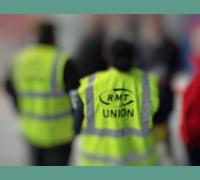RAIL UNION RMT today slammed the huge rise of violent crimes against women by more than 50 per cent on Britain’s trains as totally unacceptable.
Commenting on the latest British Transport Police statistics for the past two years, RMT general secretary Mick Lynch said that the union had longstanding concerns about the prevalence of violence on the public transport network.
“RMT’s own research has also found that 40 per cent of women public transport workers have been sexually harassed.
“Evidence shows that properly staffed trains and stations support women and girls’ feelings around their safety and security when travelling and the presence of staff can also deter perpetrators.
“These shocking figures are a reminder of the need for guards on trains, and staffed stations and ticket offices to help address the epidemic of violence against women and girls,” he said.
RMT carried out a survey of women transport workers last November and found that 40 per cent suffered abuse. You can read more about that here.
- Press releases on this site are taken from www.rmt.org.uk.
- 3805 reads
> RMT National News
- ‹ previous
- 4 of 12
- next ›





